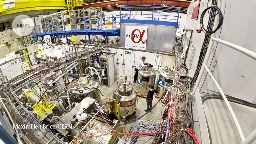It's Official, Antimatter Falls Down in Gravity, Not Up
It's Official, Antimatter Falls Down in Gravity, Not Up

www.nature.com
Antimatter falls down, not up: CERN experiment confirms theory

Since the discovery of antimatter decades ago, particle physicists have wondered if these particles were repulsed by gravity. Einstein predicted that despite having opposite charges to its regular matter counterparts, antimatter should still behave like matter does concerning gravity. This has been tricky to confirm experimentally since it's hard to make enough antimatter to observe its behavior. Particle physicists have finally pulled it off, using the ALPHA-g experiment at CERN, generating antihydrogen atoms and then dropping them in a 3-meter tall vertical shaft.
[description taken from Fraser Cain's mastodon post ]


